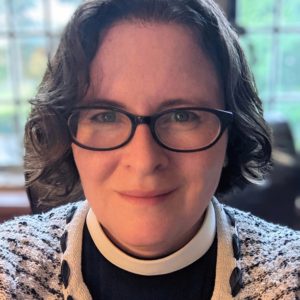Last week, we heard Jesus’s warning to stay awake, to keep alert. I talked about what it might mean to put on that metaphorical but evocative full armor of God that our Advent prayers mention, the belt of truth, the breastplate of righteousness, the shield of faith, the helmet of salvation, and the sword of the Spirit. And I talked particularly about peace—about the gospel of peace, about Jesus as the King of Peace.
Last Sunday focused on peace as the gift and promise of God, on God’s peace as a promise we can hold to even in the most difficult times.
Today, I want to talk about a more practical, day-to-day aspect of the Peace of God—of peace as the fruit of repentance and reconciliation.
I’m going to put my John the Baptist hat on for a minute. (Did he wear a hat, I wonder?)
John the Baptist is a curious figure. He’s in the mode of the great prophets of the Hebrew scriptures. He behaves outrageously. He goes out into the wilderness, dresses in clothes made of camel’s hair, eats locusts. In the tradition of the prophets, that sort of shocking, symbolic behavior was intended to get attention, to draw attention to God’s message by acting it out literally and publicly. John is the “voice of one crying in the wilderness,” and so he goes to the wilderness and cries out. He prepares the way for Jesus by urging his listeners to repent, to confess their sins, to be baptized.
It’s so very tempting to ignore John the Baptist. He’s awkward, impolite, confrontational. But his message is an important one. Repent. Prepare.
It’s a message we don’t much like to hear. We’ve gotten away from a lot of traditional talk about sin and repentance in the Episcopal Church and churches like it. And we’ve done that for good reason. Talk of sin has too often been used as a club, as a tool of power, used to shame people for things outside their control. But we lost something important in the process. Because sin is real. Every one of us is capable of doing appalling things – and the more we deny that fact, the more likely we are to do it.
Think back for a moment to the great evils of history.
The Holocaust wasn’t just the work of murderers and tyrants. It was made possible by neighbors who stayed silent in hope that trouble would pass them by. By soldiers who followed orders. By train engineers earning a day’s pay. By teenagers who dreamed of glory. By a church that sided with power instead of with justice. And by ordinary businessmen trying to feed their families.
Slavery wasn’t just the work of men who kidnapped human beings and sold them as chattel. It was made possible by farmers and stock traders and rum drinkers and missionaries. And even by housewives who dressed their families in cotton.
So many evils throughout time have been made possible by those who refused to see.
And every single one of us is capable of repeating their mistakes in our own ways and in our own time.
Aleksandr Solzhenitsyn wrote this: “If only there were evil people somewhere insidiously committing evil deeds, and it were necessary only to separate them from the rest of us and destroy them. But the line dividing good and evil cuts through the heart of every human being. And who is willing to destroy a piece of his own heart?”
There are also the simpler, more straightforward sins. The small dishonesties. The petty cruelties. Those may be easier for us to become aware of, but they’re no easier to move past. They may be harder in a way because they’re more personal, they’re more likely to cause us to feel shame.
We all have blind spots, and we all have more to repent than we know. God’s grace is sure and certain, but the path to get there requires us to look at ourselves with open eyes.
Repentance is hard. Repentance is hard because it requires ruthless honesty. It can be humbling, humiliating. To admit our failures, to call something sin without making excuses.
I think of those people who followed John the Baptist out into the wilderness. They confessed their sins, publicly it seems, and then they walked out into the middle of the river and allowed a slightly crazy guy dressed in camel hair to baptize them. Could you bring yourself to do that?
Many Christian traditions urge believers to confess their sins not just to God but to another person. That’s because we can too easily deceive ourselves when we confess only to God. Too often, we’re still wearing a mask, pretending to ourselves and to others that we’re better than we are.
But God’s promise is that the moment we drop the mask, the moment we find the courage to be honest—in that very moment we’ll find God’s forgiveness and God’s peace.
Notice the order of events in today’s opening collect. If we heed the warnings of the prophets, repent, and forsake our sins, we’ll be prepared to greet with joy the coming of Jesus Christ our Redeemer. What follows true repentance is joy, a joy that feels no need to hide from God, but rejoices to see his face.
God is patient, but still the call of the prophets is urgent. We ought to repent now so that we can live secure within the peace of God. Repentance is hard, but it’s worth it. Sin. Repentance. Forgiveness. Joy. That’s the order. But it doesn’t work if you skip a step.
If you can find the strength to be honest, though, you’ll also find “the peace of God, which surpasses all understanding.” That’s the promise. And isn’t that peace worth an awkward trip out into the wilderness to visit John the Baptist?
